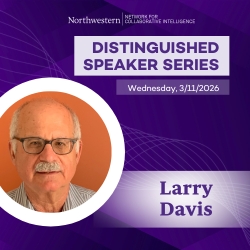Events
Past Event
Biological Systems that Learn
NSF-Simons National Institute for Theory and Mathematics in Biology
9:00 AM
Details
Many biological systems have evolved to embody solutions to complex inverse problems to produce desired outputs or functions; others have evolved strategies to learn solutions to complex inverse problems on much shorter (e.g. physiological or developmental) time scales. Another class of systems that solves complex inverse problems for desired outputs is artificial neural networks. A critical distinction between the biological systems and neural networks is that the former are not associated with processors that carry out algorithms such as gradient descent to solve the inverse problems. They must solve them using local rules that only approximate gradient descent. Thus a key challenge is to understand how biological systems encode local rules for experience-dependent modification in physical hardware to implement robust solutions to complex
inverse problems. A similar challenge is faced by a growing community of researchers interested in developing physical systems that can solve inverse problems on their own. Despite the differences between physical/biological systems that solve inverse problems via local rules on one hand, and neural networks that solve them using global algorithms like gradient descent on the other hand, each has the potential to inform the other. For example, the insight that overparameterization is important for obtaining good solutions generalizes from neural networks to physical/biological learning systems.
Examples of biological systems that learn at different scales include (1) biological filament networks such as the actin cortex, collagen extracellular matrix and fibrin blood clots, which maintain rigidity homeostasis as an output under constantly varying and often extreme stresses as inputs. (2) Epithelial tissues during various stages of development, which can undergo large shape changes and controlled cellular flows as desired outputs. (3) Immune systems, which constantly adapt to bind to invading pathogens as desired outputs. (4) Ecological systems, in which species can change their interactions (eg. learn to consume new species) in order to bolster their population as an output.
The goal of this workshop is to discover new core principles and mathematical tools/approaches shared across physical learning systems, biological learning systems and neural networks that will inform deeper understanding and future discovery in all 3 fields. To this end, we will bring together researchers interested in viewing biological problems through the lens of inverse problems, researchers working on physical learning, and researchers studying neural networks for a week of intensive discussion and cross-fertilization.
We envision a unique format for this workshop, focused on framing and discussing open questions rather than on recitations of recent results. We will ask a subset of participants to present pedagogical overviews of key topics to help members of disparate communities establish common intellectual ground for discussion.
Time
Tuesday, January 7, 2025 at 9:00 AM - 5:00 PM
Contact
Calendar
NSF-Simons National Institute for Theory and Mathematics in Biology
"Fun with Fashion" - Larry Davis
Northwestern Network for Collaborative Intelligence (NNCI)
12:00 PM
Details

Join us for an in-person Distinguished Speaker event featuring Larry Davis, a leading figure in computer vision and artificial intelligence whose influential academic career and recent industry innovations at Amazon have helped shape modern approaches to visual understanding and generative media.
Title: "Fun with Fashion"
Abstract: More than 100,000,000 customers shop for clothing online at Amazon annually in the United States alone. The fashion catalogue is enormous and changes with high velocity as new styles are introduced and older items either go out of fashion or out of stock. Customers are challenged to find clothing that fits their style and their bodies at a price that fits their budgets. The Amazon Fashion science team addresses these challenges through the design and development of new machine learning and computer vision models that help customers navigate the catalog and efficiently evaluate items Amazon is recommending to them. The talk will discuss solutions the team has developed to problems including virtual try on (what will this garment look like on me?), complementary recommendations (how do I style this garment?) and size recommendations (what size, if any, of this garment will fit me?), emphasizing the challenges introduced by the need to have scalable solutions.
Lunch will be provided. Registration is required.
Larry Davis is a Senior Principal Scientist in Amazon’s Fashion and Fitness organization. He joined Amazon in 2018 after a long career in academics. At Amazon he worked on introducing novel customer experiences for fashion shopping like outfit builder (based on complementary recommendations) and virtual try on. He led Amazon’s first GenAI team for image and video synthesis, developing models to diversify the catalogue to make it more relatable for our customers. . He received his Ph. D. from the University of Maryland in 1975 and from 1977-1981 was an Assistant Professor of Computer Science at the University of Texas in Austin. He returned to the University of Maryland in 1981 and was the founding Director of the University’s Institute for Advanced Computer Studies (1985-1994). He also served as Chair of the Department of Computer Science from 2000-2012. Larry retired from the University in 2021 and is now a Professor Emeritus and a College Park Professor. He advised more than 75 Ph. D. students at Texas and Maryland. His work spanned many aspects of computer vision, including applications in visual navigation, robotic vision, media forensics, remote sensing,fashion and fundamental problems of object detection and activity recognition. He is a Fellow of both the IEEE and the ACM.
Time
Tuesday, May 12, 2026 at 12:00 PM - 1:30 PM
Location
Calendar
Northwestern Network for Collaborative Intelligence (NNCI)
